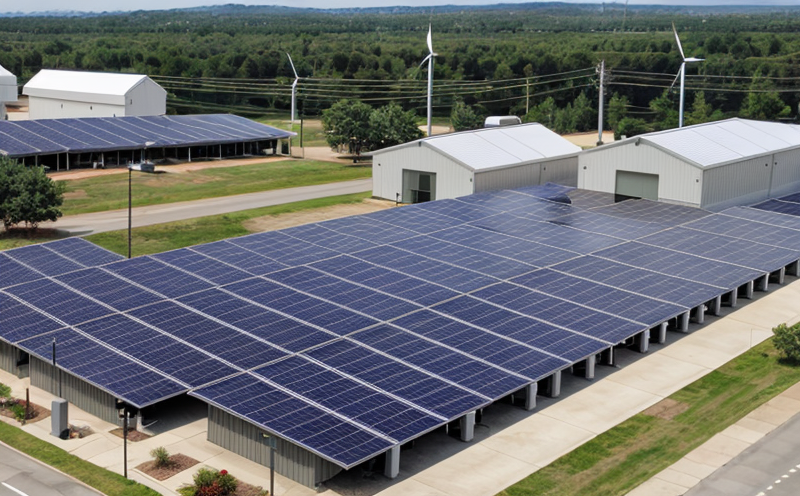ISO 14001 Environmental Impact Testing of Distributed Systems
The International Organization for Standardization (ISO) defines ISO 14001 as a management system that enables organizations to enhance their environmental performance. This standard is particularly relevant in the energy and renewable energy testing sector, where the focus on sustainability and compliance with international standards is paramount.
In the context of microgrid and distributed energy systems, ISO 14001 provides a structured approach to identifying and managing environmental impacts associated with these complex networks. These systems are designed to operate autonomously or in conjunction with centralized power grids, integrating renewable sources like solar photovoltaics (PV), wind turbines, and battery storage.
The testing process under ISO 14001 involves a comprehensive evaluation of the environmental impact across various stages, including:
- Design phase: Assessing the lifecycle impacts from material sourcing to end-of-life disposal.
- Construction phase: Evaluating emissions and resource usage during installation.
- Operation phase: Monitoring energy efficiency and greenhouse gas emissions throughout operation.
- Maintenance and repair: Ensuring that maintenance activities do not lead to significant environmental degradation.
- Decommissioning phase: Planning for the safe removal of components and disposal of waste materials responsibly.
The testing process aims to ensure compliance with ISO 14001 requirements, which include:
- Developing an Environmental Management System (EMS) that identifies potential environmental impacts.
- Setting targets for reducing these impacts through the implementation of corrective and preventive measures.
- Monitoring and reviewing the EMS to ensure its effectiveness in achieving set objectives.
This approach not only ensures regulatory compliance but also enhances the overall sustainability profile of distributed energy systems. By adhering to ISO 14001, organizations can demonstrate their commitment to environmental responsibility, which is increasingly important for both internal stakeholders and external customers.
Our laboratory specializes in conducting these tests using state-of-the-art equipment tailored to meet the stringent requirements set forth by ISO 14001. Our team of experts ensures that each test is conducted with precision and accuracy, providing clients with reliable data that can be used for decision-making purposes.
Benefits
The benefits of undergoing ISO 14001 Environmental Impact Testing of Distributed Systems are numerous and far-reaching. For quality managers, this testing ensures that their organizations are meeting the highest standards in environmental management, which can lead to improved efficiency and reduced operational costs.
Compliance officers will find value in the structured approach provided by ISO 14001, allowing them to navigate complex regulatory environments with confidence. R&D engineers benefit from detailed insights into the lifecycle impacts of their innovations, enabling continuous improvement and innovation within sustainable frameworks.
For procurement teams, this testing provides a clear understanding of supplier performance in terms of environmental responsibility, helping to build stronger partnerships and more ethical supply chains.
The broader impact extends beyond individual organizations. By adhering to ISO 14001 standards, businesses contribute positively to global efforts towards reducing carbon footprints and promoting sustainable practices across industries.
Eurolab Advantages
At Eurolab, we pride ourselves on offering unparalleled expertise in ISO 14001 Environmental Impact Testing of Distributed Systems. Our team comprises highly qualified professionals who understand the nuances of this specialized field.
- Comprehensive Knowledge: Our experts have extensive experience working with various types of distributed energy systems, ensuring that every aspect is covered during testing.
- State-of-the-Art Equipment: We utilize cutting-edge technology to conduct precise and accurate tests, providing reliable data for your organization.
- Regulatory Expertise: Our consultants stay updated with all relevant regulations and standards, ensuring that our services align perfectly with current requirements.
- Client-Centric Approach: We prioritize the needs of our clients, tailoring each testing process to meet specific goals and objectives.
Choosing Eurolab for your ISO 14001 Environmental Impact Testing not only guarantees compliance but also positions you as a leader in sustainability within your industry. Trust us to help drive positive change through rigorous scientific methods backed by international standards.
Environmental and Sustainability Contributions
- Emission Reduction: By identifying areas where emissions can be minimized, we contribute to global efforts in combating climate change.
- Resource Efficiency: Our tests help optimize resource usage, leading to reduced waste generation and enhanced operational efficiency.
- Biodiversity Preservation: Through careful assessment of impacts on local ecosystems, we support initiatives aimed at preserving biodiversity.
- Economic Growth: Sustainable practices not only benefit the environment but also contribute positively to economic growth by fostering innovation and creating new market opportunities.
Our commitment to environmental stewardship extends beyond just conducting tests; it involves actively promoting best practices that encourage sustainable development. By partnering with Eurolab, you are investing in a future where both people and the planet thrive together.





